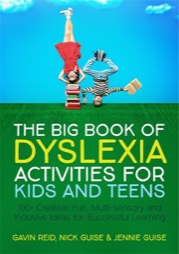Dyslexia is evident when accurate and fluent word reading and/or spelling develops very incompletely or with great difficulty. This focuses on literacy at the word level and implies that the problem is severe and persistent despite appropriate learning opportunities.' (1999) Dyslexia, Literacy and Psychological Assessment, Report of the Working Party of the DECP of British Psychological Society (BPS).
'Dyslexia is a specific learning difficulty which mainly affects the development of literacy and language-related skills. It is likely to be present at birth and to be lifelong in its effects. It is characterised by difficulties with phonological processing, rapid naming, working memory, processing speed, and the automatic development of skills that may not match up to an individual's other cognitive abilities. It tends to be resistant to conventional teaching methods, but its effects can be mitigated by appropriately specific intervention, including the application of information technology and supportive counselling.' British Dyslexia Association (BDA)
Dyslexia causes difficulties with learning to read, write and spell. Short-term memory, mathematics, concentration, personal organisation and sequencing may also be affected. Dyslexia can occur at any level of intellectual ability. It is not the result of poor motivation, emotional disturbance, sensory impairment or lack of opportunities; but it may occur alongside any of these. Dyslexia usually arises from a weakness in the processing of language-based information. Biological in origin, it tends to run in families, but environmental factors also contribute. The effects of dyslexia can be largely overcome by skilled specialist teaching and the use of compensatory strategies. People may be born with dyslexia or acquire it through accident or illness. Inclusion Development Programme 2008
Source: http://www.actiondyslexia.co.uk/view-article/Defining-Dyslexia


